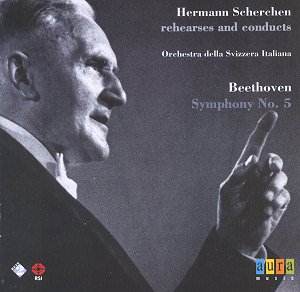To the long line of conducting rehearsal sequences
– Toscanini, Walter and Beecham spring to mind – can be added Hermann
Scherchen. This 1965 rehearsal in Lugano of Beethoven’s Fifth will not
bring the animal fury of the Italian, or the cultivated insistence of
Walter or the laconic witticisms of the bold bad Bart but they do reveal
Scherchen doing something he did well, albeit controversially, which
is conducting Beethoven. Following the rehearsal is a performance of
the Fifth and one beset on occasion by orchestral indiscipline but which
does at least reflect the broad and powerful contours established by
the seismic figure on the rostrum who is still, in concert, not entirely
able to stifle the moans and yells he visits upon the work in rehearsal.
And what a rehearsal it is. It begins with a Scherchian
exegesis – he speaks in German-inflected Italian only occasionally groping
for the mot juste – guaranteed to send English orchestral musicians
to the point of suicide. Even one of his Italian players can be heard
plucking his violin strings – a sure sign of terminal boredom – before
being shushed by another. On and on he goes for what seems like an eternity
but is probably only a few minutes. Accompanied by baton taps on the
desk, huge thumps, elephantine stamping and handclaps his soft but unquenchable
voice outlines the aesthetic of the piece and indulges in a few little
swipes along the way. In the space of a few sentences one can hear the
names of Toscanini, Hindemith, Mozart, Wagner and Busoni and whilst
my Italian is poor even I can work out that he refers to late nineteenth
century performance practice (which he reinforces by singing a pum-pum-pum-puuum
motto theme). I believe Scherchen only visited America to conduct once,
and that not long before his death; even so listeners may well be surprised
to hear him talking about the "stupid exactitude" of American
orchestras.
The rehearsal runs along expected lines. They play
through each movement, rarely stopping, with Scherchen shouting instructions
as they go. "Piano" is a constant exhortation as is "tranquillo",
the latter accompanied by what will soon become a recognisable feature
of his rehearsal technique, the anguished Scherchen howl. Fluffs – and
they come a-plenty – are ignored. Scherchen only stops the orchestra
once in the first movement and then to insist on a pianissimo entry,
shortly before the end of the movement, which he rehearses until he’s
satisfied. He makes constant demands in the slow movement, constantly
alert to dynamic values; pianissimi followed by commensurately powerful
attacks. It’s especially interesting to listen to one moment of politesse
amongst the exhortations ("Senza crescendo…grazi.") He is
very particular on beauty of tone and on the cantilever arc of a melody
emerging naturally. Again he stops them just the once to insist that
the clarinet is "timido…non crescendo" before spitting out
constant instructions - "triste" and "crescendo…non piu
forte." The sound of one of Scherchen bellowed crescendos, which
mirror the effect ("cre...scen….DO"), could be truly awe-inspiring;
he begins triple forte and works his way up. He stops the third movement,
unusually almost immediately. The Allegro is slow anyway but he is insistent
that it is more so. Rhythmic strictness is his goal here but at this
tempo one can sympathise with the orchestra. At the start of the finale
a huge unearthly animal bellow can be heard; it’s Scherchen (in the
concert he makes a mini howl at this point). This extraordinary sound,
a compound of pain and exaltation, marks his utter physical involvement
with the music; at this point he is almost hoarse, his animated cries
and instructions taking on a manic edge. He hammers out the vowels in
"crescendo", italicising each one with a rhythmic thump and
there is something driven to him here. At the conclusion of the movement
he again asks for more power and again embarks on a political and spiritual
lecture, taking in the spirit of man and even, good God, eliciting a
few laughs.
After which the performance seems, if not an anti-climax,
at least terra cognita. Or would be were the orchestral infelicities
not so marked. Brass crack, ensemble is shaky, things go seriously wrong
at one point in the first movement, Scherchen’s outwardly rather ponderous
progress causing indecision and escalating indiscipline. And yet there
is something awe inspiringly granitic about parts of his conception
that linger in the mind. His animal moans fleck the score and haunt
the performance like some wounded soul unable ever to achieve redemption.
He is viscerally alive to the humanity of the score and dares the orchestra
to follow him as he yells and screams his way to the end, facing his
own extinction – he died less than a year later - with undimmed passion
and unbridled fury.
Jonathan Woolf

